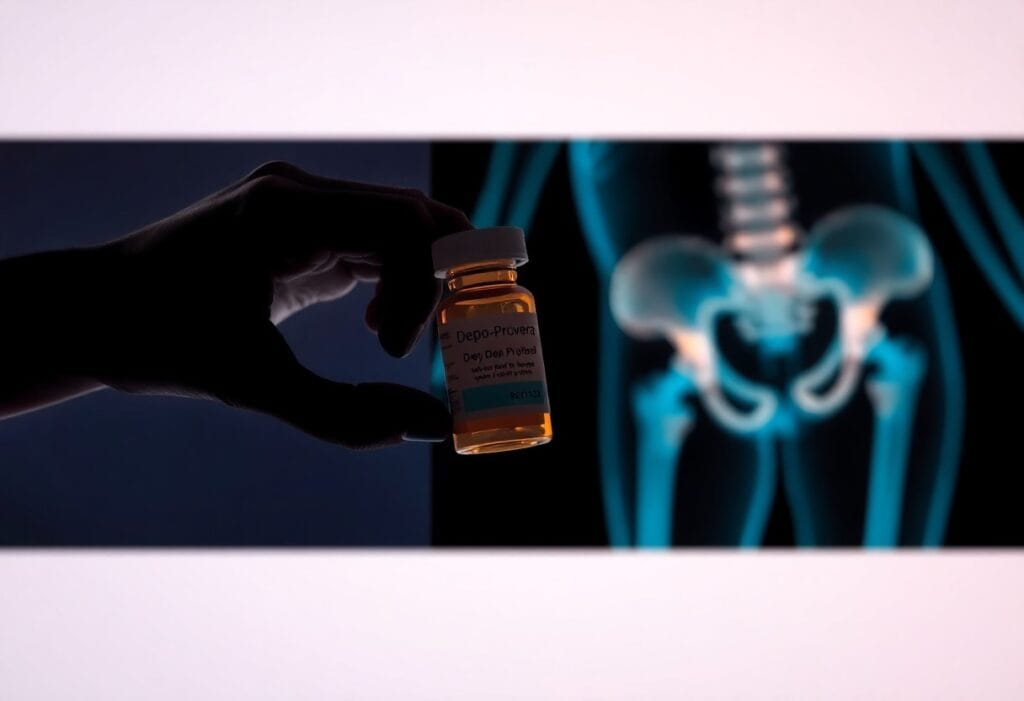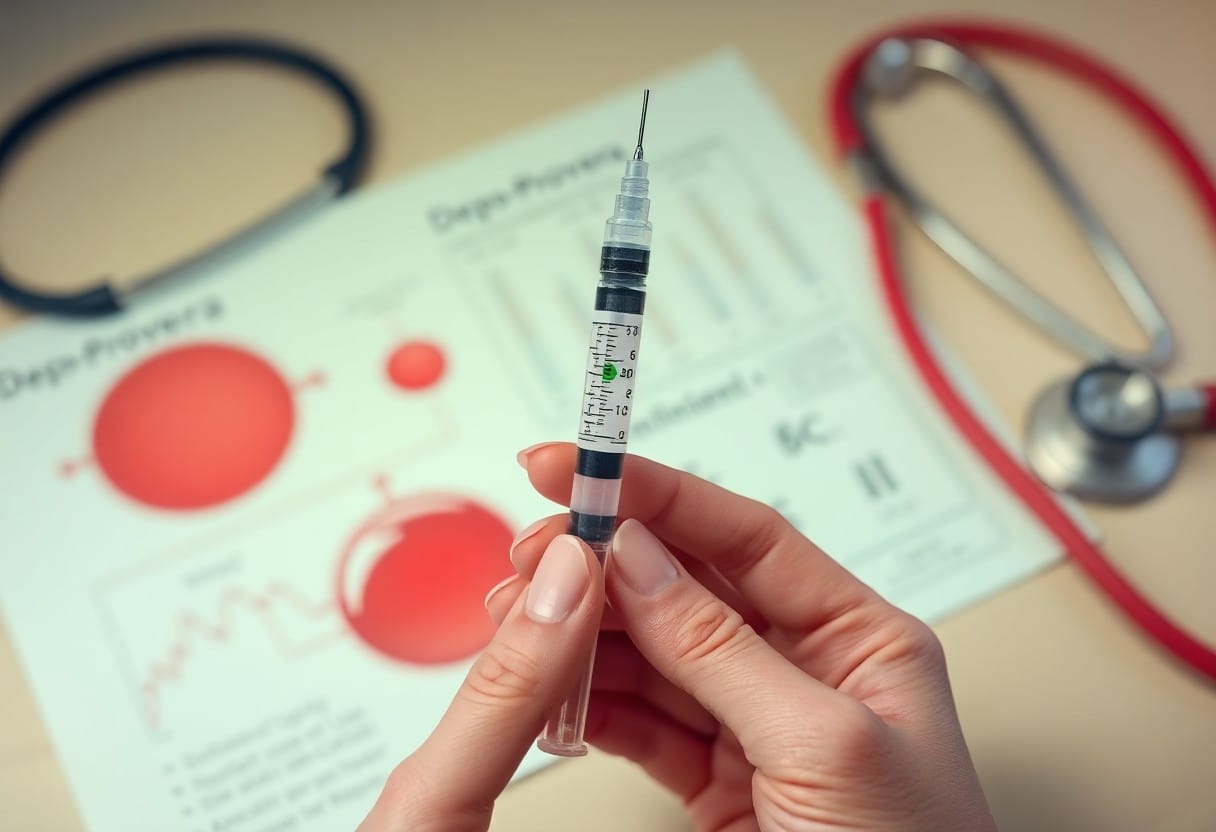Over the years, many women have turned to Depo-Provera as a convenient form of birth control. However, it’s important for you to be aware that long-term use of this contraceptive can lead to significant bone loss, particularly in women under 25. This blog will provide you with necessary information about the potential risks involved, including how to monitor your bone health and discuss options with your healthcare provider. Your well-being is a priority, and being informed is the first step in managing your health effectively.
Understanding Depo-Provera
As you explore the landscape of contraceptive options, understanding Depo-Provera is vital for informed decision-making regarding your reproductive health.
What is Depo-Provera?
What you need to know is that Depo-Provera is a hormonal birth control method, administered through an injection every three months, to prevent pregnancy effectively.
Mechanism of Action
Among the ways Depo-Provera works, it primarily prevents ovulation, thickens cervical mucus, and alters the uterine lining to prevent fertilization.
Depo-Provera’s effectiveness lies in its ability to release the hormone medroxyprogesterone acetate, which subsequently suppresses the gonadotropins responsible for ovulating. By stopping your ovaries from releasing eggs, this method of birth control lowers your chances of becoming pregnant significantly. Additionally, the increased viscosity of cervical mucus factors in, making it harder for sperm to enter the uterus, while changing the lining of the uterus also decreases the likelihood of implantation. This multi-faceted approach not only enhances effectiveness but also underscores the importance of understanding how it impacts your body.
The Link Between Depo-Provera and Bone Loss
It is vital to understand the connection between Depo-Provera and bone loss. This contraceptive method, while effective in preventing pregnancy, has been associated with reduced bone mineral density, especially in women who use it for extended periods. By comprehending how this link can impact your bone health, you can make informed decisions regarding your contraceptive options and overall health.
Scientific Studies and Findings
Depo-Provera has been the subject of several scientific studies that reveal its impact on bone density. Research indicates that women using Depo-Provera may experience significant bone loss, particularly during the first few years of use. Clinical studies have shown that this decline in bone density could result in a greater risk of osteoporosis and fractures later in life, highlighting the importance of monitoring your bone health if you are on this contraceptive method.
Factors Influencing Bone Density
Any number of factors can influence your bone density while using Depo-Provera, including:
- Duration of use
- Age at initiation
- Calcium and vitamin D intake
- Physical activity levels
After assessing these factors, it’s vital to discuss your health with a healthcare provider to mitigate the risks associated with bone loss.
Scientific research emphasizes that your lifestyle choices can significantly affect your bone health while using Depo-Provera. A well-balanced diet rich in calcium and vitamin D, consistent physical activity, and awareness of your family history of bone health can influence your outcomes. Additionally, factors such as hormonal changes, body weight, and overall nutrition play a role in determining your bone density. After evaluating these aspects, it’s vital to work closely with your healthcare professional to maintain your bone strength.
Symptoms and Risks of Bone Loss
One of the significant risks associated with Depo-Provera is bone loss, particularly with long-term use. You may experience symptoms such as increased fractures, decreased bone strength, and potentially even osteoporosis as your bone density diminishes. It’s important to understand these symptoms, as they can impact your overall health and mobility.
Identifying Bone Loss
The symptoms of bone loss can often go unnoticed until significant damage has occurred. You should be vigilant for signs such as unexpected fractures, spinal changes, or chronic back pain, all of which might indicate weakening bones. Regular check-ups and assessments can help you identify any issues early on.
Long-term Health Implications
Health risks linked to prolonged bone loss include a greater likelihood of fractures and debilitating conditions such as osteoporosis. As your bones weaken, you may find everyday activities become increasingly difficult, and your risk of serious injury escalates. It is important to monitor your health closely if you are using Depo-Provera.
Understanding these long-term health implications is vital for your well-being. If you experience significant or persistent symptoms of bone loss, consulting a healthcare professional is paramount. They can provide you with personalized recommendations for bone health maintenance, such as dietary changes and exercise programs. Engaging in weight-bearing exercises and ensuring adequate intake of calcium and vitamin D can support your bone density and overall health while using Depo-Provera.
Alternatives to Depo-Provera
Once again, it’s important to explore other options for contraception that may not carry the same risks associated with Depo-Provera. Utilizing various methods can help you maintain your reproductive health while minimizing potential side effects like bone loss. Consult with your healthcare provider to find a solution that aligns with your lifestyle and health concerns.
Other Contraceptive Methods
At this point, you might want to consider other contraceptive methods, such as oral contraceptives, IUDs, or implants. Each of these options comes with its own set of benefits and drawbacks, which can affect your choice depending on your individual needs and lifestyle. It’s necessary to discuss these alternatives with your healthcare provider for tailored advice.
Considerations for Bone Health
For your bone health, understanding how various contraceptives impact your body is vital. You should consider how long you plan on using a specific method and its potential effects on bone density. Continuous research highlights the importance of monitoring bone health, especially if you’ve experienced bone loss from Depo-Provera.
Even if you choose an alternative contraceptive method, staying informed about its effects on your bone health is necessary. Some options, like hormonal birth control, may not significantly impact your bone density, while others might. Ensure you keep track of your bone health by having regular check-ups and discussing any risks with your healthcare provider. Listening to your body and being proactive can prevent serious complications down the road. Make sure to consider all aspects of your health when selecting a contraceptive method to safeguard your overall well-being.
Preventive Measures and Monitoring
Keep in mind that regular monitoring and proactive steps can significantly help to manage the risk of bone loss while using Depo-Provera. Engaging in preventive measures is vital for ensuring your bone health remains a priority during your contraceptive experience.
Regular Screening and Assessments
Around your treatment period, it is recommended to schedule regular screenings and assessments with your healthcare provider. These evaluations can help in tracking bone density and determining if further interventions are necessary, allowing you to stay informed and proactive about your health.
Lifestyle Adjustments for Bone Health
On a daily basis, consider implementing lifestyle adjustments aimed at protecting your bone health. A balanced diet rich in calcium and vitamin D, coupled with regular weight-bearing exercises, can enhance bone strength and density over time.
At a minimum, consume foods high in calcium such as dairy products, leafy greens, and fortified foods to promote bone health. Include vitamin D-rich foods or supplements to aid calcium absorption, and engage in weight-bearing exercises like walking, jogging, or resistance training to encourage bone growth. Additionally, reduce intake of caffeine and alcohol, as these substances can negatively impact bone density. By taking these steps, you can significantly improve your bone health while using Depo-Provera. Your proactive approach can lead to a healthier future.

Testimonials and Personal Stories
Not everyone experiences the same effects from Depo-Provera, and hearing personal stories can provide insight into the diverse impacts of this contraceptive method. Many individuals have shared their experiences, detailing both positive and negative outcomes. These testimonials can be invaluable, shedding light on the potential risks you may face and offering a sense of community as you navigate your own journey.
Experiences of Using Depo-Provera
Below are narratives from users who have taken Depo-Provera, revealing both their triumphs and challenges. Some report relief from pregnancy concerns, while others struggle with unexpected side effects, such as weight gain and irregular bleeding. It’s vital to learn from these accounts to better understand what you might experience if you choose this contraceptive method.
Community Support Resources
Testimonials from various users emphasize the importance of finding support networks. To aid your journey, there are numerous online forums, support groups, and resource organizations dedicated to individuals experiencing side effects from Depo-Provera. These resources provide a platform for you to connect with others, share your story, and find reassurance in knowing that you are not alone. Engaging with these communities can help you stay informed and empowered as you manage your health.
Summing up
Taking this into account, understanding the potential risks of Depo-Provera on bone density is vital for your health decisions. While it offers effective contraception, long-term use may lead to bone loss, particularly if you have other risk factors. You should discuss your individual situation and any concerns with your healthcare provider to monitor your bone health. Staying informed and proactive can help you safeguard your well-being while utilizing this contraceptive method.

















